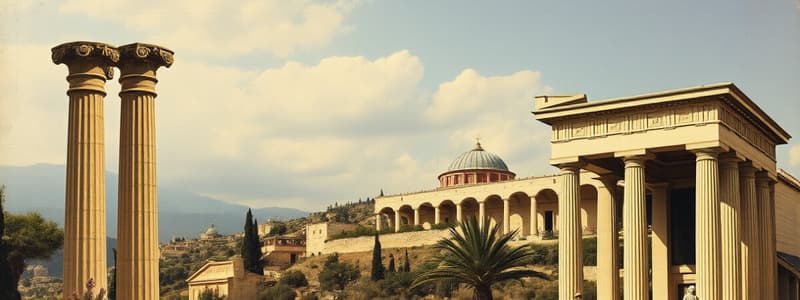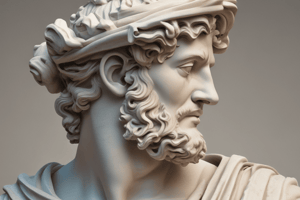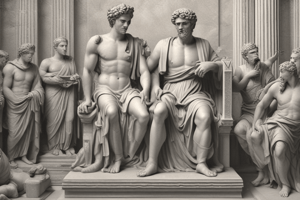Podcast
Questions and Answers
What is the time period of Classical Antiquity?
What is the time period of Classical Antiquity?
- 500 BCE - 500 CE (correct)
- 500 CE - 1000 CE
- 300 CE - 500 CE
- 1000 BCE - 500 BCE
What significant event marks the beginning of the Greek Golden Age?
What significant event marks the beginning of the Greek Golden Age?
Greek victory over Persians
When did writing begin in Mesopotamia?
When did writing begin in Mesopotamia?
3,500 BCE
The Fall of the Roman Empire signifies the end of classical antiquity.
The Fall of the Roman Empire signifies the end of classical antiquity.
What does the year 146 BCE signify?
What does the year 146 BCE signify?
What major work did Vitruvius write in 15 BCE?
What major work did Vitruvius write in 15 BCE?
In what year was the Roman capital moved to Byzantium?
In what year was the Roman capital moved to Byzantium?
What civilization emerged in Crete around 2,500 BCE?
What civilization emerged in Crete around 2,500 BCE?
What significant change occurred around 2,000 BCE in the Mediterranean/Near East?
What significant change occurred around 2,000 BCE in the Mediterranean/Near East?
What event is marked by the year 476 CE?
What event is marked by the year 476 CE?
Study Notes
Classical Antiquity Overview
- Classical Antiquity spans from 500 BCE to 500 CE, marking the Classical era in Greece to the Fall of Rome.
- This period is foundational for Greco-Roman tradition encompassing Ancient Greek and Ancient Roman styles.
Greek Golden Age
- The era from 500-400 BCE is characterized by the Greek Golden Age, following the Greek victory over the Persians.
- The culmination of Classicism occurred during this time, alongside the Athenian victory over Sparta.
- Style represented is Classical Greek.
Roman Republic and Empire
- The timeline from 400 BCE to 500 CE covers the establishment of the Roman Republic through to the Fall of the Roman Empire.
Fall of the Roman Empire
- The Fall of the Roman Empire in 500 CE signifies the end of the "Ancient World" and transitions into the Middle Ages, commonly referred to as the Dark Ages.
Origins of Civilization
- Writing commenced around 3,500 BCE in Mesopotamia (Sumer), marking the dawn of civilization.
- Wood joinery techniques developed around 3,000 BCE in Egypt, China, and Mesopotamia.
Minoan and Mycenaean Civilizations
- The Minoan civilization arose in Crete circa 2,500 BCE, indicative of advanced cultural development.
- Mycenaean civilization emerged in mainland Greece around 1,700 BCE, contributing to Greek cultural heritage.
Trade and the Bronze/Iron Age Transition
- Active trade among Mediterranean and Near Eastern civilizations began around 2,000 BCE, leading to a blend of stylistic influences and marking the end of the Stone Age, transitioning into the Bronze and Iron Ages.
Roman Conquests and Architectural Advances
- Rome conquered Greece in 146 BCE, further spreading Greco-Roman culture.
- Vitruvius authored "De Architectura," the Ten Books of Architecture, in 15 BCE, influencing Roman architecture.
Constantinople and the Western Roman Empire
- In 330 CE, Constantine relocated the Roman capital from Rome to Byzantium, renaming it Constantinople, which marked a significant shift in political power.
- The Western Roman Empire officially fell in 476 CE, with invasions by barbarian tribes leading to the end of Roman dominance in the West.
Studying That Suits You
Use AI to generate personalized quizzes and flashcards to suit your learning preferences.
Description
Explore the key stylistic periods and pivotal dates of Classical Antiquity with this quiz. Covering crucial developments from the Greek Golden Age to the Fall of Rome, you’ll gain insights into the Greco-Roman tradition and its enduring influences.





